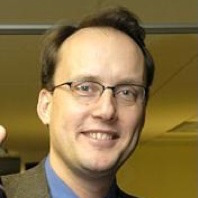Human Cooperation at the National Evolutionary Synthesis Center
Human cooperation is a broad and diverse phenomenon, and the kinds of scholars who study it are similarly diverse. Within this diversity, most scholars fall into one of two groups: social scientists who study collective action, coordination, and other aspects of human cooperation without making use of evolutionary theory, and evolutionary scientists – including evolutionary anthropologists – who ground their studies of human cooperation firmly in Darwinian theory. The theme of a book I recently co-authored with Rutgers political scientist Beth L Leech, Meeting at Grand Central: Understanding the Social and Evolutionary Roots of Cooperation (Princeton UP 2013), is that these two groups of scholars could learn a lot from each other. With this in mind, Leech and I recently hosted a Catalysis Meeting at the National Evolutionary Synthesis Center (NESCent) on “Synthesizing the Evolutionary and Social Science Approaches to Human Cooperation.” The meeting was held April 5-7, 2013, at NESCent’s offices in Durham, NC.
NESCent’s mission is to foster cross-disciplinary research on evolution. NESCent is sponsored by the National Science Foundation and jointly operated by Duke University, The University of North Carolina at Chapel Hill, and North Carolina State University. As a Synthesis Center, NESCent is particularly interested in promoting “the synthesis of information, concepts and knowledge to address significant, emerging, or novel questions in evolutionary science and its applications” (NESCent.org). One of the ways in which NESCent pursues its mission is by funding Catalysis Meetings. These one-time meetings typically involve about thirty scholars and are focused on major questions or research areas related to evolutionary biology. The goal of a Catalysis Meeting is clearly indicated by the name: To catalyze change in the evolutionary sciences by bringing leading scholars on a specific topic together for a few days to focus on an area of common interest.
Including ourselves, there were 32 scholars in attendance. Our invitees represented a variety of disciplines (anthropology, political science, psychology and biology), geographical locations (US, Japan, Hungary, Denmark, and Canada), topical interests, and career stages. We asked 12 mostly junior participants to give presentations; we cast more senior scholars as discussants.
Half of the presentations were by anthropologists. Drew Gerkey (Oregon State U) used his fieldwork in Kamchatka to frame a discussion of different kinds of groups and the way they shape cooperation. Shane Macfarlan (U Missouri) spoke about labor exchange relationships in a community on the Caribbean island of Dominica. Wesley Allen-Arave (U New Mexico) described his recent findings on the contributions of US households to charity. Montserrat Soler (UC Santa Barbara ) used her data on an Afro-Brazilian religion called Candomblé to analyze the phenomenon of religious leadership. Nicole Hess (Washington State U, Vancouver) discussed the roles of gossip and reputation in fostering cooperation. Mark Moritz (Ohio State U) described cooperation among pastoralists in northern Cameroon as a complex adaptive system in which no tragedy of the commons occurs despite open access to grazing.
The rest of the presentations were given by a combination of political scientists and psychologists. Darren Schreiber (Central European University, Budapest) made a case for the adaptiveness of human behavioral flexibility. Chris Dawes (New York U) showed how egalitarianism can facilitate cooperation. Jaime Settle (C William & Mary) conveyed her finding that there are innate differences among individuals that shape the ways in which they respond to political contention. Michael Bang Petersen (Aarhus U, Denmark) related social exchange and cheater detection theory to the phenomenon of the modern welfare state. Peter DeScioli (Harvard U) argued that moral rules help coordinate the efforts of those who might wish to punish wrongdoers. C Athena Aktipis (Arizona State U) argued that risk pooling is enhanced when people simply give to those in need rather than keep accounts of debt.
In addition to the twelve speakers and ourselves, eighteen other scholars also attended the meeting and took part in the wide-ranging discussions that occurred: Rolando de Aguiar (Rutgers U), Jacopo Baggio (Arizona State U), Frank Baumgartner (UNC Chapel Hill), Mark Flinn (U Missouri), Matthew Gervais (UC Los Angeles), Virginia Gray (UNC Chapel Hill), Brian Hare (Duke U), Patricia Hawley (Kansas), John Hibbing (Nebraska), Daniel Hruschka (Arizona State), Padmini Iyer (Rutgers), Carly Jacobs (U Nebraska), Adrian Jaeggi (UC Santa Barbara), David Lowery (Penn State U), Ben Purzycki (U British Columbia), Richard Sosis (U Connecticut), Masanori Takezawa (Hokkaido U), and Jingzhi Tan (Duke U).
The meeting also included breakout sessions for working groups on six more specific topics within the overall theme: religion and cooperation; risk-pooling and food sharing; coalitions and agenda-setting; emergence and power laws; morality, reputations, and cooperative partner choice; and the cognitive and biological underpinnings of institutions.
The meeting was a wonderful experience for us, and, we hope, for our participants, as well. Possible outcomes of the meeting include new collaborations, applications for future Catalysis Meetings on more specific topics, and general sense of excitement regarding the prospect of studying human cooperation in ways that combine insights from both the evolutionary and social sciences.
Lee Cronk is a professor in the department of anthropology at Rutgers. His research interests include human evolutionary ecology, signaling theory, culture, and cooperation. He has conducted field work in East Africa and the Caribbean.
